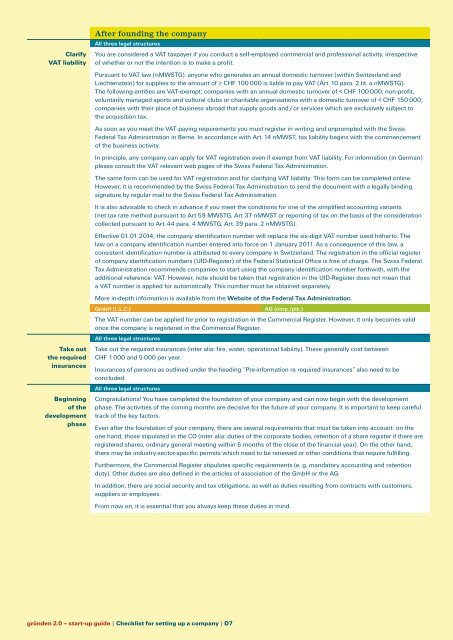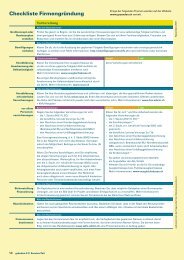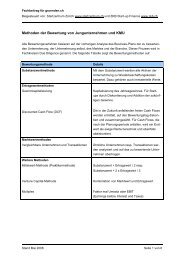gründen 2.0 start-up guide - Gruenden.ch
gründen 2.0 start-up guide - Gruenden.ch
gründen 2.0 start-up guide - Gruenden.ch
Create successful ePaper yourself
Turn your PDF publications into a flip-book with our unique Google optimized e-Paper software.
Clarify<br />
VAT liability<br />
Take out<br />
the required<br />
insurances<br />
Beginning<br />
of the<br />
development<br />
phase<br />
After founding the company<br />
All three legal structures<br />
You are considered a VAT taxpayer if you conduct a self-employed commercial and professional activity, irrespective<br />
of whether or not the intention is to make a profit.<br />
Pursuant to VAT law (nMWSTG), anyone who generates an annual domestic turnover (within Switzerland and<br />
Lie<strong>ch</strong>tenstein) for s<strong>up</strong>plies to the amount of ≥ CHF 100 000 is liable to pay VAT (Art. 10 para. 2 lit. a nMWSTG).<br />
The following entities are VAT-exempt: companies with an annual domestic turnover of < CHF 100 000; non-profit,<br />
voluntarily managed sports and cultural clubs or <strong>ch</strong>aritable organisations with a domestic turnover of < CHF 150 000;<br />
companies with their place of business abroad that s<strong>up</strong>ply goods and/or services whi<strong>ch</strong> are exclusively subject to<br />
the acquisition tax.<br />
As soon as you meet the VAT-paying requirements you must register in writing and unprompted with the Swiss<br />
Federal Tax Administration in Berne. In accordance with Art. 14 nMWST, tax liability begins with the commencement<br />
of the business activity.<br />
In principle, any company can apply for VAT registration even if exempt from VAT liability. For information (in German)<br />
please consult the VAT relevant web pages of the Swiss Federal Tax Administration.<br />
The same form can be used for VAT registration and for clarifying VAT liability. This form can be completed online.<br />
However, it is recommended by the Swiss Federal Tax Administration to send the document with a legally binding<br />
signature by regular mail to the Swiss Federal Tax Administration.<br />
It is also advisable to <strong>ch</strong>eck in advance if you meet the conditions for one of the simplified accounting variants<br />
(net tax rate method pursuant to Art 59 MWSTG, Art 37 nMWST or reporting of tax on the basis of the consideration<br />
collected pursuant to Art. 44 para. 4 MWSTG, Art. 39 para. 2 nMWSTG).<br />
Effective 01. 01. 2014, the company identification number will replace the six-digit VAT number used hitherto. The<br />
law on a company identification number entered into force on 1 January 2011. As a consequence of this law, a<br />
consistent identification number is attributed to every company in Switzerland. The registration in the official register<br />
of company identification numbers (UID-Register) of the Federal Statistical Office is free of <strong>ch</strong>arge. The Swiss Federal<br />
Tax Administration recommends companies to <strong>start</strong> using the company identification number forthwith, with the<br />
additional reference: VAT. However, note should be taken that registration in the UID-Register does not mean that<br />
a VAT number is applied for automatically. This number must be obtained separately.<br />
More in-depth information is available from the Website of the Federal Tax Administration.<br />
GmbH (L.L.C.) AG (corp./plc.)<br />
The VAT number can be applied for prior to registration in the Commercial Register. However, it only becomes valid<br />
once the company is registered in the Commercial Register.<br />
All three legal structures<br />
Take out the required insurances (inter alia: fire, water, operational liability). These generally cost between<br />
CHF 1 000 and 5 000 per year.<br />
Insurances of persons as outlined under the heading “Pre-information re required insurances” also need to be<br />
concluded.<br />
All three legal structures<br />
Congratulations! You have completed the foundation of your company and can now begin with the development<br />
phase. The activities of the coming months are decisive for the future of your company. It is important to keep careful<br />
track of the key factors.<br />
Even after the foundation of your company, there are several requirements that must be taken into account: on the<br />
one hand, those stipulated in the CO (inter alia: duties of the corporate bodies, retention of a share register if there are<br />
registered shares, ordinary general meeting within 6 months of the close of the financial year). On the other hand,<br />
there may be industry-sector-specific permits whi<strong>ch</strong> need to be renewed or other conditions that require fulfilling.<br />
Furthermore, the Commercial Register stipulates specific requirements (e. g. mandatory accounting and retention<br />
duty). Other duties are also defined in the articles of association of the GmbH or the AG.<br />
In addition, there are social security and tax obligations, as well as duties resulting from contracts with customers,<br />
s<strong>up</strong>pliers or employees.<br />
From now on, it is essential that you always keep these duties in mind.<br />
<strong>gründen</strong> <strong>2.0</strong> – <strong>start</strong>-<strong>up</strong> <strong>guide</strong> | Checklist for setting <strong>up</strong> a company | D7






